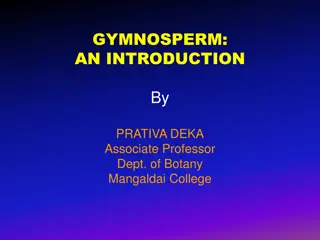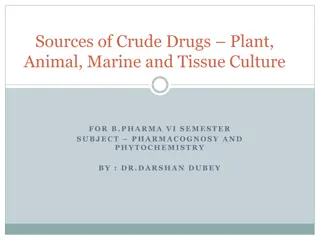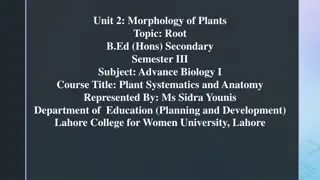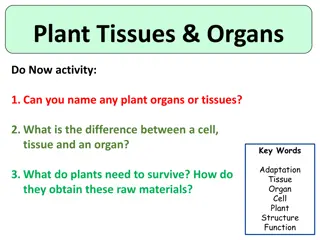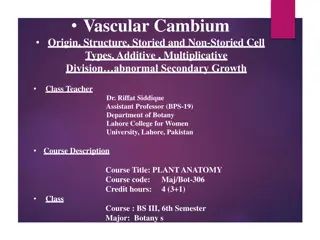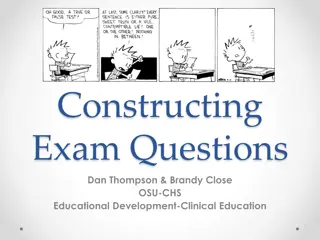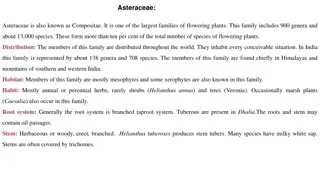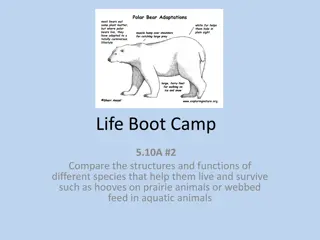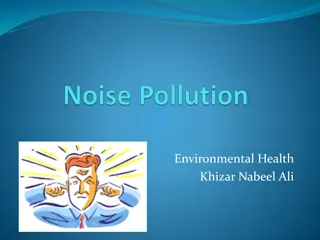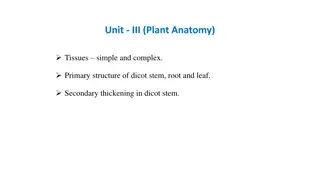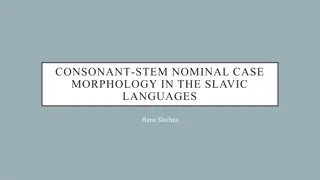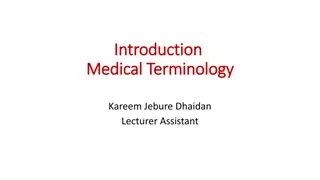Introduction to Gymnosperms: Key Characteristics and Features
Gymnosperms are seed-producing plants with exposed ovules, lacking fruits. They have true roots, stems, and leaves, with majority being tall, woody, perennial plants. Male and female flowers are borne on separate structures, and pollination occurs via wind. Gymnosperms exhibit unique features such a
6 views • 6 slides
Importance of Arizona Department of Education Career Technical Skills Assessments
Assessment is crucial as it measures students' knowledge and skills across a broad range of content. Students face challenging questions that may include unfamiliar topics, encouraging them to demonstrate their best abilities. Successful completion leads to an industry-endorsed certificate. The test
0 views • 14 slides
Overview of Iranian Languages: A Linguistic Analysis Based on Fortson
Iranian languages, divided into Old, Middle, and Modern branches, exhibit distinct phonological and morphological features compared to Indic languages. The presentation explores differences in Iranian phonology, including deaspiration of voiced aspirates and spirantization of voiceless stops, and ex
0 views • 9 slides
Fossil Plants: Sphenophyllum and Zygopteris Anatomy
Dr. Jithesh Krishnan R, Asst. Prof. at NSS College, Pandalam, specializes in studying Fossil Pteridophytes like Sphenophyllum and Zygopteris. These ancient plants date back to the Devonian period and showcase unique stem anatomy resembling roots. Sphenophyllum had slender shoots with whorled leaves,
0 views • 11 slides
Sources of Crude Drugs: Plant, Animal, Marine, and Tissue Culture in Pharmacognosy
Crude drugs are natural substances obtained from plants, animals, and minerals. They are used without much processing and have therapeutic properties. Different plant parts like leaves, flowers, fruits, seeds, roots, bark, and stems yield various important drugs. Animals and minerals also serve as s
1 views • 19 slides
Essential Tips for Planting Woody Plants in Brunswick County Landscapes
Explore important considerations for selecting, buying, and planting woody plants in Brunswick County landscapes, including information on tree roots, plant stems, container vs. balled and burlapped plants, and key steps for successful planting. Learn about proper tree and shrub planting techniques
0 views • 12 slides
Advisory Jurisdiction of Supreme Court of India
Most countries grant their apex courts original and appellate jurisdiction, but the Indian Constitution includes advisory jurisdiction for the Supreme Court. Article 143 allows the President to seek the Court's opinion on important public matters. The Court advises the President, although it's non-b
2 views • 31 slides
Morphological Characters of Roots in Plant Systematics and Anatomy
The morphology of plant roots is essential in understanding plant systematics and anatomy. Roots are categorized into two main groups: Tap Roots and Adventitious Roots. Tap roots directly arise from the seed and can be fibrous, tuberous, conical, fusiform, or napiform. Adventitious roots develop fro
1 views • 7 slides
Understanding Stem-and-Leaf Displays in Data Analysis
Stem-and-leaf displays offer a detailed way to represent quantitative data by organizing data into stems and leaves. This method allows for the recovery of original data values, providing more specific insights compared to histograms. Learn how to create stem-and-leaf displays and apply them in data
0 views • 17 slides
Plant Tissues and Organs: Understanding the Structure and Function
Explore the world of plant tissues and organs, learn about their functions, differences between cells, tissues, and organs, and discover how plants survive and obtain essential raw materials for growth. Dive into the roles of leaves, stems, and roots in plant physiology, and enhance your understandi
1 views • 14 slides
Understanding Transpiration in Plants: Importance and Mechanisms
Transpiration is the process in which plants lose water vapor through their aerial parts, playing a crucial role in their overall functioning. This loss of water occurs mainly through stomata, lenticels, and the cuticle of leaves and stems. Different types of transpiration like stomatal, lenticular,
0 views • 19 slides
Understanding the Importance of Nonverbal Communication in Communication Skills
Nonverbal communication plays a crucial role in conveying messages and signals through platforms like eye contact, facial expressions, gestures, posture, and spatial distance. It includes appearance, body language, silence, time, and space. This form of communication can significantly impact the rec
0 views • 16 slides
Interactive Hololens Tour Project Overview
This project involves creating a Microsoft Hololens heads-up display for an interactive tour of the ASU campus. It includes showcasing landmarks and a Twitter feed displaying geo-tagged tweets. The motivation stems from enhancing self-guided tour experiences for prospective students, potentially aid
1 views • 15 slides
Understanding Manodarpan Initiative for Mental Health Well-being
Manodarpan is an initiative by the Ministry of Human Resource Development, Government of India, focusing on mental health well-being. It addresses the importance of holistic health, including physical, social, emotional, and mental aspects. The initiative aims to help individuals cope with daily str
0 views • 28 slides
Understanding Proteus Bacteria: Historical Significance, Pathogenesis, and Laboratory Diagnosis
Proteus species, named after the Greek god Proteus, exhibit pleomorphism. Their historical importance stems from the unique characteristics of H and O antigens, with flagellated strains resembling a thin film on agar. Pathogenically, Proteus mirabilis and P. vulgaris are opportunistic pathogens caus
0 views • 12 slides
Understanding Vascular Cambium in Plant Anatomy
Vascular cambium is a crucial growth layer in stems and roots, responsible for producing xylem and phloem in plants. It originates from the maturation of procambium cells, differentiating into storied and non-storied cell types. It plays a vital role in secondary growth by generating new wood in woo
0 views • 26 slides
Understanding Rejection and Its Impact on Our Lives
Rejection is the root of offense and can have profound effects on our mental health and well-being. It stems from disregarding, invalidating, or disrespecting someone or something, leading to limiting beliefs and triggers that impact our behavior and emotional state. Exploring rejection can help unc
0 views • 10 slides
Understanding Secondary Growth in Plants: Boerhaavia (Dicot) vs. Dracaena (Monocot)
Secondary growth, resulting from cambial cell division, thickens stems and roots in plants. This process involves cambium, a tissue layer between xylem and phloem, responsible for secondary growth. Cambium ray initials give rise to vascular rays and secondary xylem/phloem. The seasonal activity of c
0 views • 24 slides
Enhancing Thinking Skills through Writing Strategies in Education
The writing revolution emphasizes the use of The Hochman Method and engaging activities to improve students' understanding of various subjects. It focuses on sentence structure, fragment identification, and utilizes sentence stems for cognitive checks in history and geography classes.
0 views • 32 slides
Assessment Item Construction Strategies for Effective Learning
Explore principles of constructing assessment items using Bloom's Taxonomy, crafting meaningful stems, incorporating valid content, and avoiding pitfalls for reliable evaluations in educational settings.
0 views • 17 slides
Overview of Personal Data Protection Bill, 2018
The Personal Data Protection Bill, 2018 addresses concerns regarding personal privacy amidst advancing technology. It grants rights to individuals and mandates transparency in handling personal information. The Bill stems from the recognition of the right to privacy as fundamental. It defines terms
0 views • 23 slides
Overview of Asteraceae Family: Characteristics and Habitat
Asteraceae, also known as Compositae, is one of the largest families of flowering plants with around 13,000 species. They show diverse characteristics such as herbaceous or woody stems, simple leaves, and distinctive inflorescence types like racemose heads. This family is widely distributed globally
0 views • 12 slides
Understanding the Every Student Succeeds Act (ESSA) of 2015
The Every Student Succeeds Act (ESSA) is a civil rights law that stems from the 1965 Elementary and Secondary Education Act (ESEA) focusing on equity, transparency, stakeholder engagement, and accountability at the school level. ESSA requires states to have college and career readiness standards, as
0 views • 10 slides
Essential Principles for Effective Risk Management
Risk management involves minimizing or mitigating risks that arise from uncertainty. In organizations, this uncertainty often stems from the marketplace. Ideally, risk management follows a prioritization process, addressing risks that pose the greate
3 views • 1 slides
Revolutionizing Asset Valuation: Longevity Specialty Finance, LLC's Competitive Advantage
Longevity Specialty Finance, LLC (LSF) is setting new standards in valuing level-3 assets and liabilities through their exclusive use of the Longevity Cost Calculator (LCC). The LCC, based on a proven longevity predictive algorithm, allows LSF to accurately price and value assets with unknown future
0 views • 11 slides
Understanding Plant Anatomy and Characteristics
Explore the diverse aspects of plant life cycles, habitats, vegetative organs, stems, aerial stem modifications, leaves, phyllotaxy patterns, and leaf durations. Gain insights into the classification of roots, different types of plant habitats, and the arrangement of leaves on stems. Discover the va
2 views • 9 slides
Comparative Structures and Functions in Different Species
Explore how various species' physical adaptations, such as hooves and webs, aid in their survival. Understand the key roles of specific plant parts like stems and sunflower sections. Discover how specialized structures in animals like deer and polar bears contribute to their survival strategies.
0 views • 101 slides
Understanding the Impact of Noise Pollution on Health and Environment
Noise pollution is a prevalent issue affecting our health and environment. It includes unwanted sound that disrupts daily activities, leading to various health problems like hearing loss, high blood pressure, stress, and more. This pollution stems from both outdoor sources like construction and road
0 views • 27 slides
Understanding Food Sources: Plants and Animals Explained
Food is essential for nourishing our bodies, and it comes from either plants or animals. Plants provide fruits, vegetables, grains, and more, while animals offer products like meat, milk, and eggs. Different parts of plants, such as roots, stems, and leaves, are consumed as food. Animals have varied
0 views • 11 slides
Building an International Child Protection System: The Hague 1996 Convention
The need for an international child protection system stems from the globalization and increasing situations where children require coordinated actions across national borders. Limitations in national systems prompt the call for international cooperation through tools like conventions and networks.
0 views • 14 slides
Understanding Bullying: Causes, Effects, and Solutions
Bullying is the repetitive, intentional hurting of one person or group by another, causing physical, emotional, and academic problems. It stems from various factors like rage, jealousy, and a need for control. The consequences include psychological effects such as depression and anxiety. Simple solu
0 views • 7 slides
UN Recommendations for Responding to NEO Impact Threats
The Action Team on NEOs, established by the United Nations, has put forth recommendations for an international response to the threat of near-Earth object impacts. This initiative stems from the work of the COPUOS and its subcommittees, aiming to address potential NEO impact scenarios through collab
0 views • 26 slides
Spiritual Caregiving: Tips and Strategies for Effective Support
Understanding the essence of spiritual/pastoral caregiving, which stems from the image of the Shepherd, involves active listening, recognizing anxiety as a positive trigger, and providing support without trying to fix every problem. Different types of spiritual visits cater to various needs within t
0 views • 14 slides
Alphagram Word Challenge with Scrabble Tiles and Mnemonic Phrases
Explore the world of wordplay with challenging alphagrams like ACELST and discover bingo stems, associated phrases, and word formations. Delve into the realm of Scrabble tiles and mnemonic aids for enhancing your vocabulary mastery. Unleash your linguistic creativity and strategic thinking in the fa
0 views • 45 slides
The Anglophone Crisis in Cameroon: Historical Roots and PCC's Response
The Anglophone Crisis in Cameroon stems from the country's colonial past, dating back to the partition between Britain and France. This crisis has evolved over the years, leading to recent developments and tensions. The Presbyterian Church in Cameroon (PCC) has played a significant role in addressin
0 views • 40 slides
Plant Anatomy: Understanding Tissues and Growth in Plants
Plants have various types of tissues, including meristematic and permanent tissues, which play crucial roles in their growth and structure. Meristematic tissues are responsible for growth in specific regions, while permanent tissues undergo differentiation to perform specific functions. Understandin
0 views • 32 slides
Various Types of Stems in Plants - A Visual Guide
Culms, pseudostems, weak stems, and more - explore the diverse forms of plant stems such as jointed culms in bamboos, unbranched aerial shoots in onion and garlic, and creeping stems like runners and stolons. This visual guide showcases the unique characteristics of different plant stems with detail
0 views • 142 slides
Understanding Slavic Nominal Case Morphology & Stems
Uncover the intricacies of consonant-stem nominal case morphology in Slavic languages, from the introduction to the case system to the classification of consonant stems into major groups such as *u-stems, *n-stems, *s-stems, *nt-stems, and *r-stems. Explore the unique characteristics of *-stems, *o-
0 views • 11 slides
Understanding Medical Terminology: Key Components and Definitions
Medical terminology is essential for effective communication in healthcare. It consists of prefixes, stems, and suffixes that help convey precise meanings. Understanding these components is crucial for healthcare professionals to interpret medical records, communicate accurately, and ensure patient
0 views • 10 slides
Understanding the Anatomy and Functions of Plant Stems
Plant stems play a crucial role in the growth and survival of plants. They transport water, minerals, and sugars, support leaves and flowers, and store food. The outer structures of stems, such as buds and nodes, are essential for plant growth. Furthermore, the tissues inside the stem, including xyl
0 views • 12 slides
